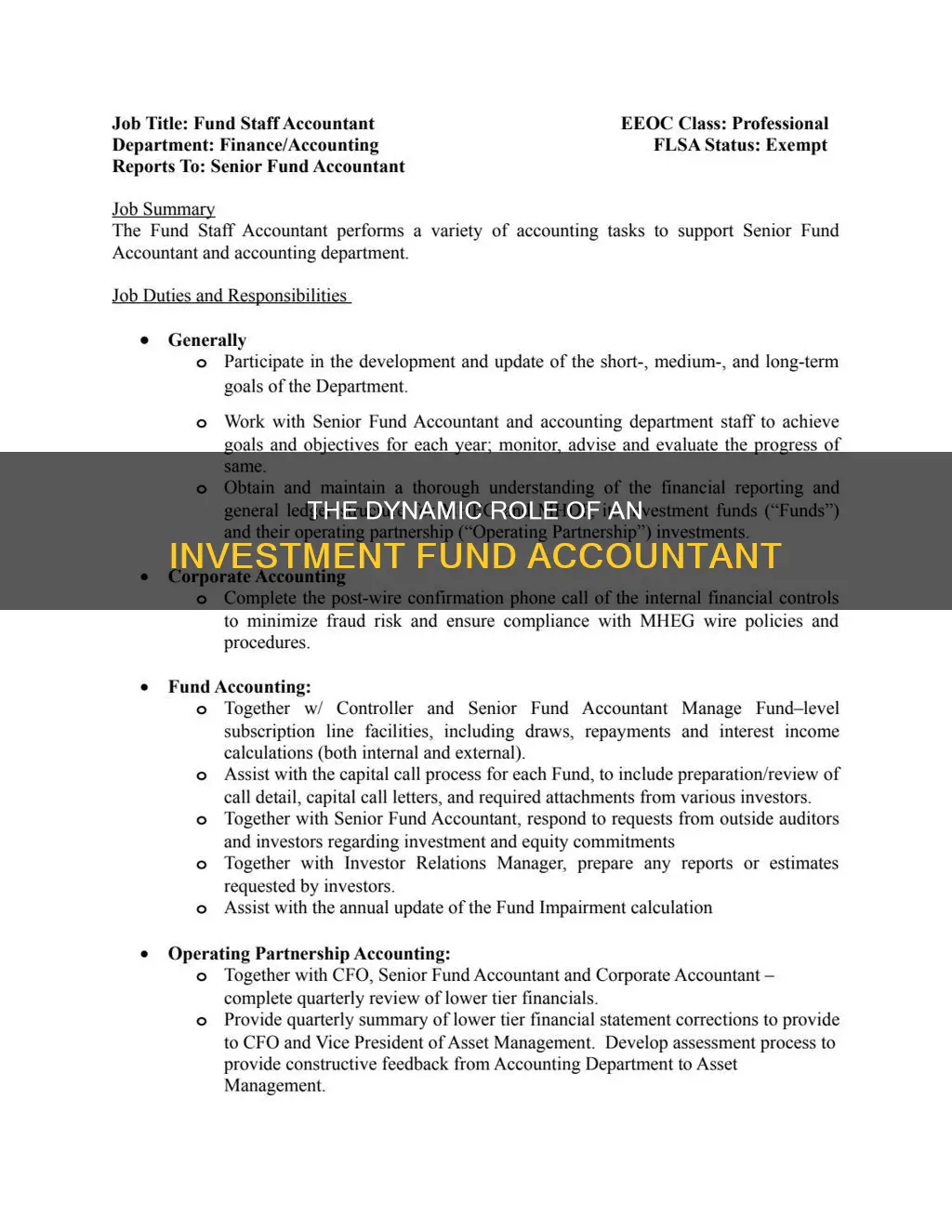
Investment fund accountants are responsible for the day-to-day accounting of investment funds, such as hedge funds or mutual funds. They manage the financial records of these funds and ensure accuracy in reporting. This includes tracking and recording transactions, preparing financial statements, and monitoring investment performance. They work with investment managers, investors, advisors, and tax professionals to make effective decisions about resource allocation and ensure compliance with regulations. Fund accountants also assist in the design and implementation of internal audit practices, coordinate with fund administrators, and provide support to lower-level staff. Their work involves creating systematic structures for fund administration, ensuring timely and accurate outputs, and promoting accountability and transparency.
| Characteristics | Values |
|---|---|
| Primary responsibility | Day-to-day accounting for assigned mutual or institutional funds |
| Prepare | Timely and accurate fund accounting output, including net asset values, yields, distributions for subsequent review |
| Calculate and report | Net asset values per unit |
| Compile | Standard weekly and monthly financial statements and income expense accruals |
| Conduct | Daily analysis of various financial metrics to help firms set a price or value of their funds |
| Calculate and report | Income, expense, and item-specific accrual statements including a dividend or interest income worksheet and other schedules including a T-bill |
| Monitor and record | Security transactions including trade, interest payment, maturity and corporate actions |
| Report | Findings promptly to clients and ensure their findings adhere to laws, compliance, and protocol |
| Work with | Investment managers, investors, investment advisors, and tax professionals |
| Minimum qualification | Bachelor's degree in accounting, finance, or related fields |
| Skills | Accounting, financial analysis, data entry, spreadsheet, communication, computer, math, industry knowledge, active learning, time management |
| Play a role in | Corporate governance |
| Ensure | Compliance with procedures, policies and controls |
What You'll Learn
- Investment fund accountants monitor transactions and ensure effective resource use
- They work with investment managers, investors, tax professionals and advisors
- They perform daily analysis of financial metrics to help set fund prices
- They prepare financial statements and reports for investors and fund managers
- They ensure compliance and accountability, and assist with corporate governance

Investment fund accountants monitor transactions and ensure effective resource use
Investment fund accountants are responsible for monitoring transactions and ensuring effective resource use. They play a crucial role in managing financial records and ensuring accuracy. This involves preparing timely and accurate fund accounting output, including net asset values, yields, and distributions for subsequent review. Fund accountants also work with investment managers, investors, investment advisors, and tax professionals to efficiently manage funds.
One of their key responsibilities is to track cash flow, which is essential given the significant amount of money flowing in and out of a fund. They also onboard clients, explaining the organisation of the fund's accounts and their responsibilities. Fund accountants act as intermediaries between investors and advisors, communicating suggestions and making adjustments as necessary.
Additionally, fund accountants are responsible for reporting to investors, creating reports for clients to monitor and helping them make informed decisions. They also prepare annual audits, providing the necessary documentation for independent auditors.
To ensure effective resource use, fund accountants conduct daily analysis of various financial metrics. This helps firms set prices or values for their funds and make informed investment decisions. Fund accountants calculate and report income, expenses, and accruals, ensuring compliance with laws and regulations.
They also assist in the design and implementation of internal audit practices and procedures, as well as coordinating with fund administrators for accounting and reporting matters. Fund accountants play a crucial role in ensuring accountability and transparency, contributing to an organisation's efforts towards good corporate governance.
Unlocking Interval Fund Investment Opportunities: Exploring Strategies
You may want to see also

They work with investment managers, investors, tax professionals and advisors
Investment fund accountants work with investment managers, investors, tax professionals, and advisors to manage funds efficiently. They are responsible for tracking a fund's transactions and ensuring that the entity uses its resources effectively. This includes monitoring and analysing transactions to determine a fund's investment potential.
Investment fund accountants also work closely with investment managers and investors to provide financial reporting and analysis. They prepare timely and accurate fund accounting outputs, including net asset values, yields, and distributions for subsequent review. They conduct daily analysis of various financial metrics to help firms set a price or value for their funds. They also calculate and report income, expenses, and accruals.
In addition, investment fund accountants work with tax professionals to ensure compliance with tax regulations. They collect tax compliance data and prepare tax reports, ensuring that the fund meets all tax obligations.
Furthermore, investment fund accountants coordinate with investment advisors, communicating their suggestions to clients and making adjustments as necessary. They act as intermediaries between investors and advisors, ensuring that the fund's activities are in line with the prospectus.
Smart Strategies for Investing $5K in Mutual Funds
You may want to see also

They perform daily analysis of financial metrics to help set fund prices
Investment fund accountants are responsible for the day-to-day accounting of their assigned mutual or institutional funds. They perform daily analysis of financial metrics to help set fund prices. This involves monitoring and recording security transactions, including trade, interest payments, maturity, and corporate actions. They also calculate and report net asset values per unit, as well as compile standard weekly, monthly, and quarterly financial statements.
For example, an investment fund accountant might review and analyse fund activities to ensure the accuracy of net asset value (NAV) and yield calculations. They would also ensure that the fund's books and records are reconciled and that the fund's activities align with its prospectus.
In addition, investment fund accountants assist in ensuring compliance with regulatory requirements and promoting accountability and transparency within the organisation. They play a crucial role in managing financial records and ensuring accuracy, performing daily cash reconciliations, and identifying discrepancies between accounting ledgers and custody bank statements.
Through their daily analysis of financial metrics, investment fund accountants provide timely and accurate data that serves as a basis for decision-making by fund managers and other stakeholders. Their analysis helps firms set a price or value for their funds and make informed investment choices.
Funding an Investment Farm: Strategies for Success
You may want to see also

They prepare financial statements and reports for investors and fund managers
Investment fund accountants are responsible for preparing financial statements and reports for investors and fund managers. They provide accounting services for investment portfolios, including commodities, securities, and real estate.
They play a crucial role in managing financial records and ensuring accuracy. They prepare daily and monthly net asset valuations for hedge fund clients and review source documentation for financial statement reporting. Investment fund accountants also perform daily cash reconciliations, ensure the correct recording of financial data, and identify discrepancies between accounting ledgers and custody bank statements.
They calculate and report net asset values per unit and compile standard weekly, monthly, and quarterly financial statements. They conduct daily analyses of various financial metrics to help firms set prices for their funds. They also calculate and report income, expenses, and item-specific accrual statements, including dividend or interest income worksheets and other schedules.
Additionally, investment fund accountants assist in the design and implementation of internal audit practices and procedures. They review and analyse fund activities to ensure the accuracy of net asset value and yield calculations. They also ensure compliance with procedures, policies, and controls and report their findings to relevant parties.
Quant Fund Investment: Strategies for Success
You may want to see also

They ensure compliance and accountability, and assist with corporate governance
Investment fund accountants play a crucial role in ensuring compliance and accountability and assisting with corporate governance. They ensure that funds comply with procedures, policies, and controls and confirm that periodic reviews are completed and reported to relevant parties. This includes monitoring client investments and understanding the rules around managing investments in a particular region.
Investment fund accountants also assist in promoting accountability and transparency. They contribute to an organisation's efforts toward transparency, an important feature in the field of funds and investment portfolios. They do this by creating systematic structures to administer funds and other investment portfolios. They design internal accounting practices and procedures, and develop policies for accounting-related functions to ensure accurate fund prices.
Additionally, investment fund accountants ensure compliance with tax requirements. They prepare tax reports and ensure that the organisation meets all tax obligations and complies with legal rules and regulations. They also assist in reviewing compliance and regulatory filings.
The work of investment fund accountants is essential for achieving organisational goals, especially in the investment and funds markets. Their timely and accurate outputs allow fund managers to make effective decisions about resource allocation and reporting to stakeholders.
Federal Building Fund: Investment Strategies for Success
You may want to see also
Frequently asked questions
A fund accountant is a financial professional who monitors the transactions of an investment fund. They work with investment managers, investors, investment advisors, and tax professionals to manage funds efficiently.
Fund accountants are responsible for tracking an investment fund's transactions and ensuring that the entity uses its resources effectively. They prepare timely and accurate fund accounting output, including net asset values, yields, and distributions for subsequent review. They also calculate and report income, expense, and accrual statements.
To become a fund accountant, you typically need a bachelor's degree in accounting, finance, or a related field. Some employers may also require prior experience in a consulting position or proficiency with specific software and systems.
In addition to technical skills in accounting and finance, fund accountants should have strong analytical, communication, and problem-solving skills. Attention to detail, organizational skills, and the ability to handle work pressure are also important for this role.
While both roles involve managing investment portfolios, there are some differences. Fund accountants focus on the day-to-day accounting and financial record-keeping for their assigned funds. They work with various stakeholders to ensure compliance and accurate reporting. Investment accountants, on the other hand, often work outside the tax realm and are responsible for monitoring client investments, managing debt investments, and tracking third-party investment activities. They may also provide financial consulting and tax research services.







